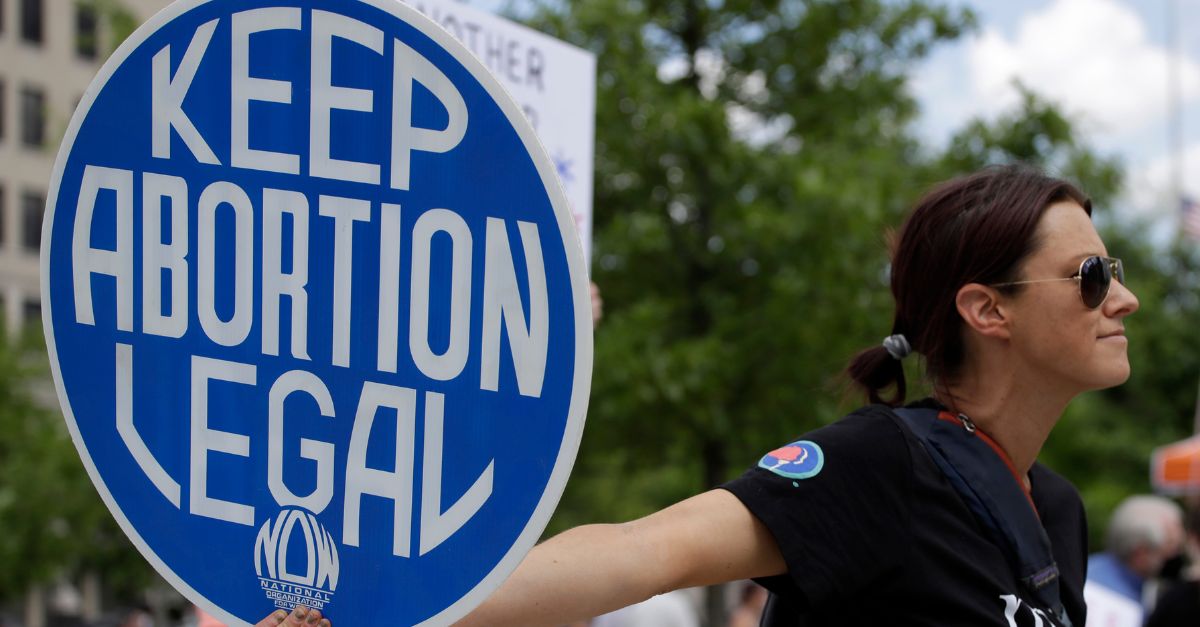
Abortion-rights demonstrator holds a sign during a rally on Saturday, May 14, 2022, in Chattanooga, Tenn. (AP Photo/Ben Margot).
A federal court in Tennessee on Friday barred state officials from enforcing a law that criminalizes advising minors of their right to travel to another state to obtain a legal abortion.
In June 2024, Rachel Welty, an abortion advocate, along with a state representative who opposed the law, filed an 82-page lawsuit against several of the Volunteer State”s elected district attorneys general over their “criminal enforcement authority” to enforce and “affirmative statutory obligation” to defend the disputed anti-abortion law.
The lawsuit was premised on the claim that one section of the law, 39-15-213, criminalizes “both pure speech about legal abortion care and helping young people access legal abortion care.” In September 2024, the court issued a preliminary injunction while the case moved forward; the lawsuit itself asked for a permanent injunction.
Now, Senior U.S. Circuit Judge Julia S. Gibbons – originally a Ronald Reagan appointee later elevated by George W. Bush – who oversaw the case siting by designation, has granted that requested relief in a 32-page memorandum opinion and order.
Love true crime? Sign up for our newsletter, The Law&Crime Docket, to get the latest real-life crime stories delivered right to your inbox.
“Section 39-15-201 prohibits speech encouraging lawful abortion while allowing speech discouraging lawful abortion,” the judge wrote. “That is impermissible viewpoint discrimination, which the First Amendment rarely tolerates and does not tolerate here.”
The language of the law at issue purports to make it a crime for someone who “intentionally recruits” a minor to obtain an abortion.
In her opinion, Gibbons says this “recruitment provision” – under various definitions of the word “recruits” – would “proscribe” the plaintiffs’ “abortion-related advocacy and counseling.”
Such counseling and advocacy is protected by the First Amendment, the court found, because minors are directed out-of-state where they can obtain court orders to bypass parental consent laws.
The defendants, for their part, said any speech helping a minor obtain an abortion – in-state or out-of-state – is in service of a crime. That’s because abortion is, generally, illegal in Tennessee.
The court rejected this notion, at length:
Because abortion is generally illegal in Tennessee, the state may constitutionally punish speech made in direct furtherance of in-state abortions (with limited exceptions). In other words, Tennessee may criminalize speech recruiting a minor to procure an abortion in Tennessee (again, with limited exceptions). The state may not, however, criminalize speech recruiting a minor to procure a legal abortion in another state. Because plaintiffs wish to speak about legal abortions and seek to help minors obtain legal, out-of-state abortions, their intended speech is protected under the First Amendment. Of course, these out-of-state abortions would be illegal if they occurred in Tennessee. But they do not occur in Tennessee. And Tennessee cannot criminalize “disseminating information about an activity that is legal in [another] [s]tate.”
“Because plaintiffs promote only legal abortions, the speech integral to crime exception does not apply and plaintiffs’ speech remains protected,” the opinion goes on.
Notably, the plaintiffs also challenged the law as constitutionally vague. They argued the word “recruits” is “susceptible to many different definitions” and left undefined in the statute – and therefore it was unclear just what was being criminalized.
In a double-edged sword of interpretation, the court rejected this claim, though the technical win for the defendants did not really matter. In her ruling, Gibbons determined the word “recruits” was sufficiently clear enough to give “fair warning” of the “proscribed conduct,” but found the prohibition itself is unconstitutional.
The plaintiffs’ legal team welcomed the court’s decision.
“Judge Gibbons’ thoughtful and well-reasoned opinion protects the right of all Tennesseans to share truthful information about abortion without fear that crusading prosecutors will try to punish them criminally for doing so,” attorney Daniel A. Horwitz said in a press release. “It also affirms that the government has no authority to enact overbroad laws that criminalize pure speech based on the government’s disagreement with a speaker’s point of view. This is a major victory for Ms. Welty, Representative Behn, and all Tennesseans who believe that the government has no right to prosecute citizens for sharing truthful information.”








